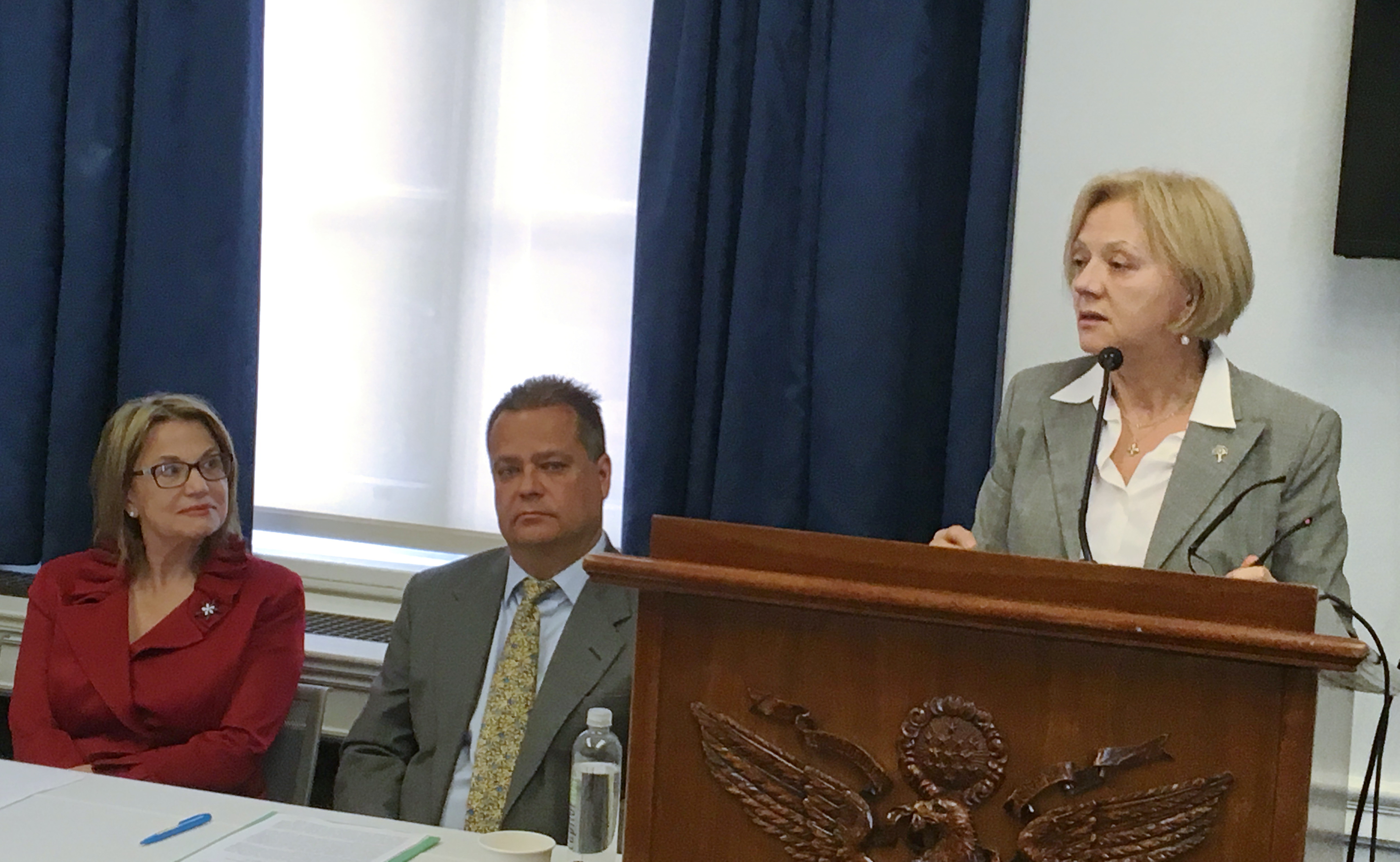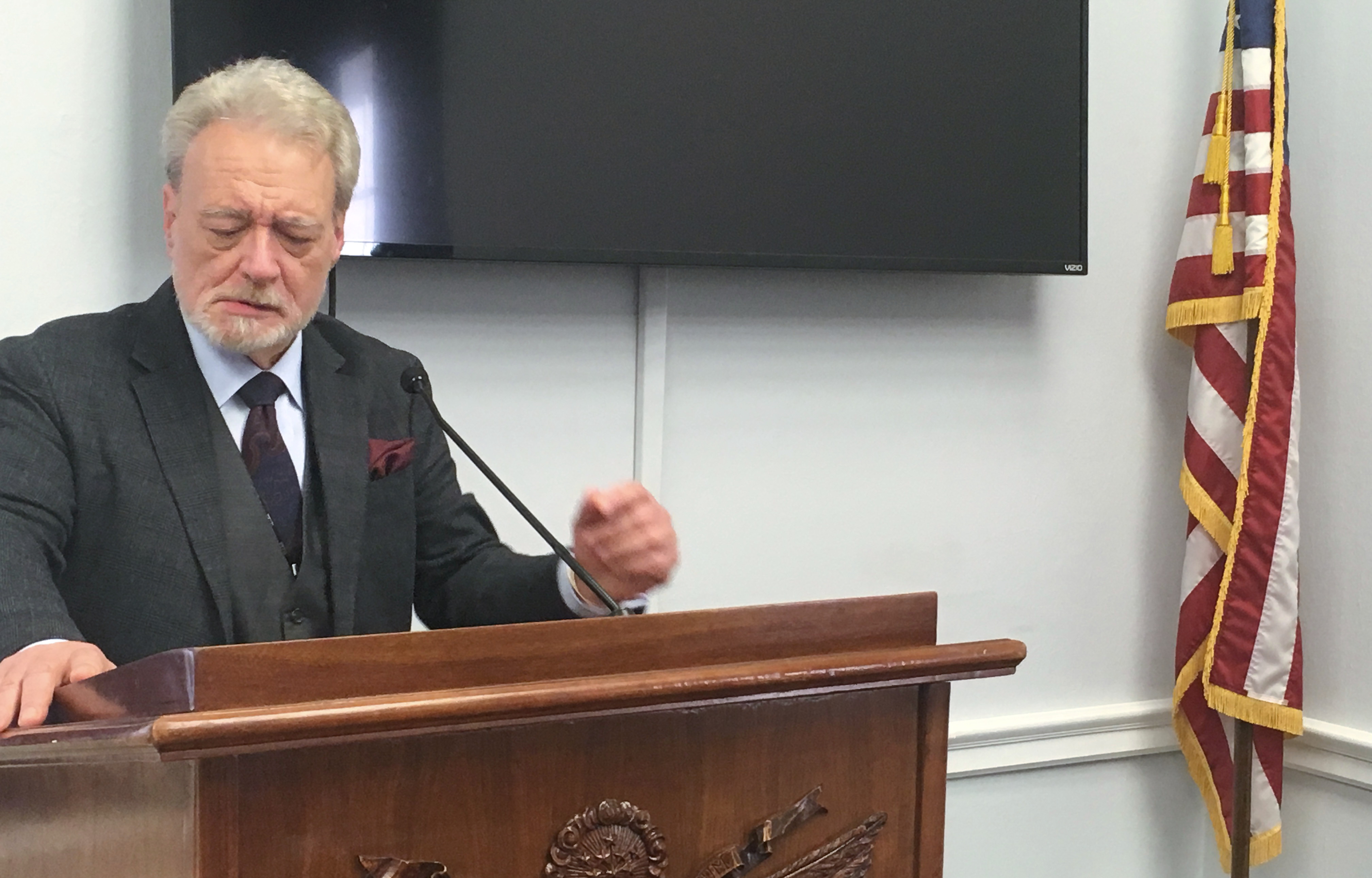WASHINGTON, D.C. — Ukrainian-Americans are commemorating the fifth anniversary of the end of the EuroMaidan Revolution, which ended after security forces shot dead more than 100 demonstrators in Kyiv in February 2014, the same month that Kremlin-backed President Viktor Yanukovych fled power.
The biggest diaspora organization in the U.S., the Ukrainian Congress Committee of America, held its main event to mark the anniversary at the Cannon Office Building in the nation’s capital on Feb. 8. The speakers, including members of Congress, talked about various aspects of the EuroMaidan and how it dramatically changed Ukraine’s course.
UCCA president, Andriy Futey, and Michael Sawkiw, director of the Ukrainian National Information Service, hosted the event and described how the protests were triggered in the fall of 2013 when Yanukovych suddenly reversed his pledges to bring his country into closer formal relations with the European Union and instead embraced Kremlin dictator Vladimir Putin’s plans for a Moscow-led economic union.
Angry Ukrainians believed Putin was trying to crush their country’s aspirations for the rule-of-law and democracy epitomized by the European Union. They also believed the Kremlin strongman needed Ukraine as the lynchpin of his desire to rebuild a new Russian empire.
Nearly 100 days of mass demonstrations followed in Kyiv with protesters camped out in the capital’s central Maidan Nezalezhnosti, or Independence Square, from which the term “EuroMaidan” was derived.
The protests gradually took on the character of a revolt against Yanukovych’s rule. His security forces failed to break the popular uprising, despite shooting dead scores of demonstrators who subsequently became known as “The Heavenly Hundred.”
Yanukovych fled to Moscow, after having looted billions of dollars from Ukraine’s treasury, and following what also is known as the Revolution of Dignity, Putin invaded and annexed Crimea and Russia occupied part of eastern Ukraine’s Donbas region.
Other speakers included Marta Farion, president of the Kyiv Mohyla Foundation and vice president of UCCA’s branch in the state of Illinois, home to a large Ukrainian-American population; Irena Chalupa, a leading member of the StopFake team debunking the Kremlin’s anti-Ukrainian propaganda; Phillip Karber, president of the Washington-based think tank, the Potomac Foundation and an expert on the EuroMaidan and Ukraine’s war against Russia; Ukraine’s Ambassador to the United States Valeriy Chaly.
Farion, talking about the “Heavenly Hundred” and the challenges that Ukraine faces, referred to the words of the president that many regard as America’s greatest leader, Abraham Lincoln, saying: “It is for the living to dedicate themselves to the unfinished work for which the ones who perished fought.”

Irena Chalupa, a leading member of the StopFake program that debunks Kremlin propaganda, speaks in Washington, D.C. on Feb. 8 as Marta Farion, president of the Kyiv Mohyla Foundation and Illinois vice president of Ukrainian Congress Committee of America, and UCCA President Andriy Futey listen. (Askold Krushelnycky)
U.S. Congress support for Ukraine
Republican House of Representatives member from the state of Maryland, Andy Harris, who is a co-chairman of the Congressional Ukrainian Caucus, said that U.S. lawmakers took a great interest in Ukraine and “those who seek to fight for freedom there.”
He said: “Never forget the ideal of keeping Ukraine free and knowing you have a partner in the U.S. Congress……that works with the administration and any entities we need to work with to ensure that Ukraine stays free. Whether it’s dealing with the situation in Crimea or Donbas – whatever it takes – you have a partner here.”
Chalupa said the Heavenly Hundred were not “just an abstract concept” but fathers, grandfathers, sons, husbands, brothers, ranging in ages from 17 to 83.
She lamented though that bringing justice for the Heavenly Hundred by identifying and prosecuting those who killed them has been very slow in coming.
“These people have become part of Ukraine’s mythical narrative of nation-building, of sacrifice, of heroism,” said Chalupa. She said she subscribes to that legend and believes the diaspora should not only remember those who died but “propagate their cause” by encouraging support for Ukraine.
Another Republican co-chair of the Ukrainian Caucus, U.S. Representative Brian Fitzpatrick of Pennsylvania, has visited Ukraine as part of his interest in anti-corruption and cyber-security matters in the country.
He said:” I’m of Irish descent but I see Ukraine as my third country after the United States and Ireland and I deeply care about the Ukrainian nation and its people.”
He spoke of the need for “unequivocal and unapologetic seamless relations between the United States and Ukraine” in terms of military, intelligence, financial support from Washington for Kyiv. Fitzpatrick promised to continue being a ‘voice for Ukraine” within the U.S. Congress.
Heavenly Hundreds’ fight continues
Carl Gershman is president of the National Endowment for Democracy, funded by both major political parties in America – Democrats and Republicans – to promote democracy around the world.
He talked about the organization’s considerable work in Ukraine which had been spearheaded by the NED’s vice president, Nadia Diuk, a U.S. citizen, born in the U.K of Ukrainian origin, who died of cancer last month (see the Kyiv Post obituary about her).
Gershman said that the sacrifice of those who died on the EuroMaidan must inspire Ukrainians to continue “to build a sense of responsibility in civil society. Why did that Heavenly Hundred die if not for the freedom of Ukraine?”
He said continuing their cause entailed fighting corruption and creating vibrant civil society. He believes that democracy in Ukraine will ultimately influence a turn toward democracy in Russia.
Gershman said more progress had been made since the EuroMaidan than in the previous decades since 1991 independence in building civil society in Ukraine. He said: “We know there are problems: stalled structural reforms, Russian disinformation, Ukraine has been fighting a two-front war since the EuroMaidan – a hot war in the east and then a war against corruption and for democracy in society and she has to win on both of these fronts.”
Phillip Karber has visited many times since 2014 the front lines where Ukrainian troops have defended their country against Russian regular military invaders and Moscow’s puppet “separatist” fighters.
He suggested that the Heavenly Hundred are more accurately “the Heavenly Thousands” because so many Ukrainian fighters “have stood up against evil” and died defending the country since Russia invaded.
U.S. Representative Brendan Boyle from Pennsylvania has worked on the House of Representatives foreign affairs committee on Ukrainian security issues.
He said Putin’s invasion of Ukraine “was for the first time since the end of World War II an attempt to redraw the borders of Europe by force. If we allow that to happen that is not where Putin will stop.”

Phillip Karber, president of the Washington-based think tank, the Potomac Foundation, and an expert on the EuroMaidan Revolution and Russia’s war against Ukraine, speaks on Feb. 8.
America will stand with Ukraine
U.S. Deputy Assistant Secretary of State George Kent, until recently the deputy chief of mission at the U.S. Embassy in Kyiv, said: “U.S. citizens and the U.S. government stood with Ukraine five years ago during the Revolution of Dignity, we stand with them now, and we will stand with Ukraine in the future.”
He pointed to the decentralization of government power so that local authorities, and thus ordinary people, have more control over their destinies as one of the most important consequences of that revolution. Kent believes that when people have the ability to resolve their own problems, “good things happen.”
He said that “Our pledge as the United States is that we will continue to partner with the Ukrainian government and civil society on this path.
“Successful anti-corruption reforms and accountable institutions are critical to Ukrainians’ ability to pursue lives of dignity at home; to attract the foreign investments, including from U.S. investors that will create value and give jobs to Ukrainians.”
On the immediate practical front, Kent said that Washington would continue to press Moscow to release the Ukrainian Navy sailors and vessels it took prisoner after Russia’s unprovoked attack last November in the Kerch Strait channel leading to the Azov Sea and would step up demands for the release of Ukrainian political prisoners held by the Kremlin.
Ukraine’s acting health minister, Ulana Suprun, was to have been the keynote speaker but did not attend because of her court battle against attempts to remove her from office by Radical Party member of Ukraine’s parliament, Ihor Moysichuk.
Ukrainian communities in New York City, Chicago, Philadelphia and elsewhere across the U.S. will hold events around Feb. 20 to remember the shootings on the Maidan.
The Ukrainian Orthodox and Catholic churches will hold prayer services and have organized exhibitions to mark the tragedy as well as victory of five years ago.
This Feb. 17 there will be a candlelit vigil at the Holodomor Monument in Washington, not far from the U.S Capitol building.
